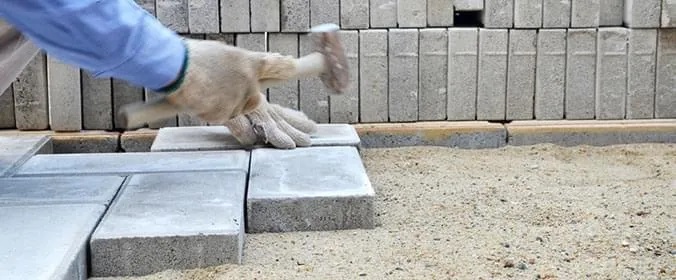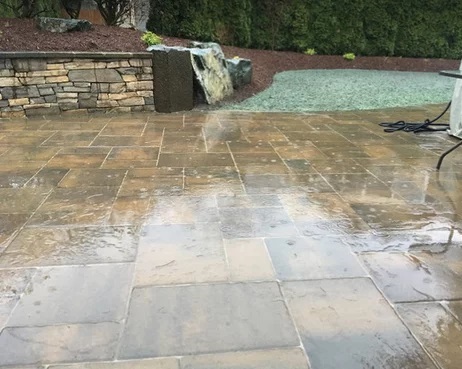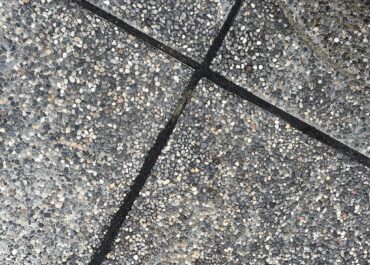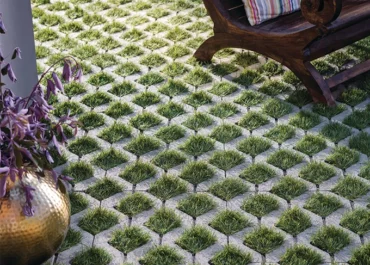
Owning a beautiful paver driveway is a common dream of many homeowners across the globe. Nothing quite beats the efficiency and visual appeal of a paver installation. However, for all its popularity, many people still don’t have a clue about all the details involved in a paver installation. For example, a very common question is “can you pave a driveway in the rain?”.
We have heard that and many other questions that cover the basics of a paver installation over our 14 years of activity. So, we decided to compile all these questions into this article, covering the basics of a paver installation. Hopefully, this will clarify many of your doubts and point into the right direction when start thinking about your installation.
Can You Pave a Driveway in the Rain?
To be very blunt: no. Absolutely not, in fact.
A paver installation requires a dry weather, as dry as possible. Installing pavers involves a lot of digging and a lot of sand, both things that don’t go very well with rain.
The digging part of the project is actually its most important part, as it is what will determine the longevity of the installation as a whole. If you make a mistake during this part, you probably will have to deal with it for a long time.
It is at this moment that you will establish a slope on your installation. This slope will be fundamental to the proper drainage of your installation. Without it, water will accumulate at the bottom and ruin the entire base in which the pavers will be placed upon.
So you can only imagine how much damage trying to do that during a rainy will cause you. Digging during the rain not only is way harder, is also more dangerous, as you might cause some minor landslides and end up digging what you didn’t wanted to.
And also, the sand.
In case you didn’t know, sand is extremely important for a paver installation. It is directly responsible for creating the interlocked system paver are famous for. During the rain, you won’t be able to spread the sand optimally.
Aside from the layer of sand that pavers are placed upon, the installation is considered finished once you spread polymeric sand on it, sweeping it to fill the joint between the pavers. The problem is, polymeric sand becomes a strong bonding agents when wet, which is wonderful for a normal paver installation, but terrible if try to perform it during the rain.
So, to summarize: no. Don’t even consider trying to pave a driveway in the rain.
Best Weather to Install Pavers
The best possible weather to install pavers is during a dry spell of around two days, with no forecast for rain in the two days following the installation. We know this might prove difficult in some regions, but that would be the ideal scenario.
On the day of the installation itself, the weather should be as dry and sunny as possible.
Wind can be a problem if you don’t like dust. Working with sand, especially at the final step of the installation, can lead to a great amount of dust if there’s a lot of wind around.
Cutting Pavers in Windy Conditions
There is yet another important aspect that we need to talk about that relates a little to weather: cutting pavers.
We always recommend you plan your installation in order to not need cutting any pavers, but we know that sometimes that is unavoidable.
If you’re going to need to cut some pavers, this article can give you some help. What’s important to know regarding weather is that, with wind, the dust that comes from cutting pavers can easily spread around to your vicinities, and that is something you want to avoid at all costs.
In most places, there are actual laws in place to keep that from happening.
The dust that comes from cutting pavers is very damaging to your health. That’s why it is always best to try to avoid it at all costs. But if you do, always wear gloves, protection googles and a construction mask.
Also, you’ll need to use something called “wet-cutting” technique. This consists in keeping the paver wet as you cut it. Some blades already have that built in, but you can do it with the help of someone, asking them to keep a constant flow of water on the paver using a garden hose while you cut it.
So be very careful when installing paver during windy weather.

Paving a Driveway in the Rain: Ask for Professional Help
So now you know it is a very bad idea to try to pave a driveway in the rain. So bad, in fact, that most professionals will simply walk away and refuse to take the job if you insist on doing it during rainy weather.
There’s good reason for it. It is not simply “your problem”. A paver installation during rain will for sure go wrong, and qualified hardscape professionals simply won’t like to be accountable for an installation that will give problems in the future.
But professionals will also give you options and help you decide when it is the best possible time to do the installation. As fun as it is to tackle a project from a DIY perspective, the best course of action is to always hire professionals to help you.
Here at Eagle Pavers, over our 12 years of experience, we have helped countless homeowners with their projects, so we know the importance of working closely to homeowners to make sure everything comes out perfect.
In fact, if you happen to be around our area of activity, the Sarasota and Manatee counties, in FL, why not give us a call to help you?
You can contact us right now at +1 941-210-4192 or email us at sales@eaglepavers.us. We would be happy to hear from you and help you with your porcelain paver project.




